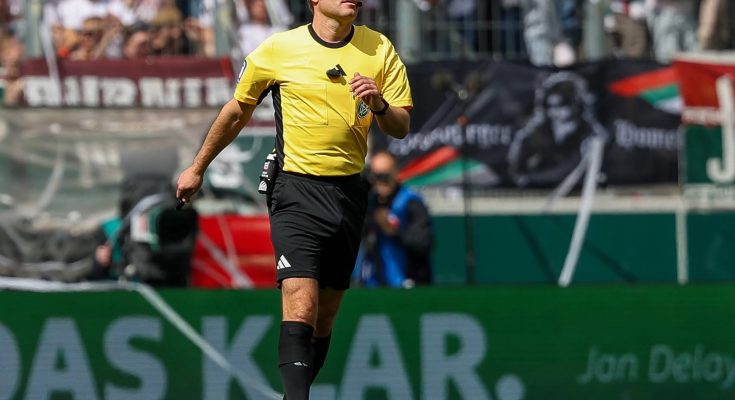The thrilling 3-3 draw between 1. FC Cologne and VfL Wolfsburg last weekend has left fans and pundits alike in a state of shock and disbelief. While the match itself was a spectacle of drama, it has quickly become the subject of fierce debates not only over the result, but also regarding the role of the referee. In the aftermath of what many have described as a wild game, a series of accusations and suspicions have begun to swirl around the officiating decisions that took place during the match. What was meant to be a regular Bundesliga fixture has now sparked a serious discussion about the integrity of the refereeing, with fans raising questions about potential foul play.
The game itself was a rollercoaster of emotions, with six goals, several controversial incidents, and plenty of near-misses. Cologne, who came into the match looking for a much-needed victory, were forced to settle for a draw after a dramatic equalizer from Wolfsburg in the dying minutes. On the surface, it was a contest that showcased all the elements of modern football: high tempo, passionate fan support, and moments of brilliance. But beneath the excitement of the goals and the thrills, certain refereeing decisions have begun to stand out in a way that has left many questioning whether the outcome of the game was truly fair.
The first contentious moment came early in the match. Cologne, in a rapid counter-attack, found themselves with a potential penalty shout after a Wolfsburg defender appeared to make contact with the ball using his arm inside the penalty area. The referee, however, waved play on. The decision was met with immediate protests from Cologne players, who were adamant that the handball had been clear. In real-time, the incident seemed marginal, but replays showed that the ball had indeed struck the defender’s hand. It wasn’t a situation where the handball had been accidental or outside of the natural position of the body, making the decision feel more contentious to Cologne supporters.
Despite the early frustration, Cologne managed to push forward and take the lead midway through the first half. Wolfsburg responded soon after with an equalizer that appeared to come from an offside position. Again, the referee’s decision not to flag the goal raised eyebrows among viewers. Replays showed that Wolfsburg’s striker had been in a clearly offside position when the ball was played through, leading many to believe that the linesman had made a serious error in judgment. Even if it was a close call, the fact that no flag went up left many wondering if the officials had been too lenient.
As the match progressed, the drama continued. Cologne regained the lead only for Wolfsburg to strike back once more, with an impressive long-range shot that deflected off a Cologne defender and wrong-footed the goalkeeper. While the goal itself was legitimate, the build-up to it had fans on edge, particularly because Cologne had been denied what many felt was a blatant foul just moments before the strike. A Wolfsburg player had clearly fouled a Cologne midfielder in the build-up, and yet the referee had failed to call the infraction. This was a key turning point in the game, as it not only led to a goal, but it also seemed to show a lack of consistency in how the referee was handling similar incidents.
The final moments of the match were, of course, the most dramatic. With the score at 3-2 in favor of Wolfsburg, Cologne threw everything forward in search of an equalizer. In the dying seconds, the equalizing goal came—an audacious header from a corner kick that left the Wolfsburg goalkeeper with no chance. It was a moment of pure footballing magic. However, even as Cologne celebrated their late goal, another controversy arose. Wolfsburg fans, along with several pundits, believed that a Cologne player had been guilty of pushing a Wolfsburg defender in the penalty area before the cross had come in. In what was perhaps the most heated debate following the game, many felt that this push had gone unnoticed by the referee and that the goal should have been disallowed.
The incidents from the match, taken together, have led to growing suspicions among both Cologne supporters and neutral observers. Were these errors in officiating simply the result of human mistakes, or was there something more sinister at play? Given the magnitude of the match and the stakes for both teams, it is understandable that fans are now asking these questions.
Some of the most vocal critics have pointed to what they believe is a pattern of inconsistent officiating in recent weeks, not just in this game but in a number of Bundesliga fixtures. Accusations of bias have begun to surface, with some suggesting that the referee’s decisions seemed to favor Wolfsburg at crucial moments. Wolfsburg, after all, is a club that has consistently underperformed in recent seasons, and a victory over a team like Cologne—who are fighting for a European spot—could have been seen as a potential game-changer for their fortunes.
Others argue that such allegations are nothing more than the result of fans’ frustrations after a disappointing match. The 3-3 scoreline, after all, was still a fair reflection of the drama that unfolded on the pitch. Even if the referee made a few questionable decisions, there is no hard evidence to suggest that those mistakes were intentional or part of any larger conspiracy. However, the emotional response from fans cannot be ignored. When a match is as intense as this one was, the fine margins between success and failure often come under the microscope. For Cologne supporters, the feeling that the referee had not been impartial only added to the heartbreak of the final result.
Football has a long history of refereeing controversies, and these kinds of disputes are not uncommon. From questionable penalty decisions to inconsistent VAR calls, the refereeing of matches has always been a hotbed of controversy. In recent years, however, the rise of social media has made it easier for fans and pundits to voice their opinions and rally support for their respective sides. In this instance, the Cologne-Wolfsburg match has sparked a wave of online discourse, with some fans even calling for an investigation into the officiating of the match.
Despite the noise and the growing suspicion surrounding the officiating, the fact remains that the referee in question is highly experienced and one of the more respected figures in the Bundesliga. In the end, the blame may not lie with any particular individual, but rather with the inconsistent nature of officiating as a whole. Football, by its very nature, is a game of gray areas, and even the best referees can make mistakes. But when those mistakes occur in high-stakes situations, they can have a lasting impact on the integrity of the competition and the trust that fans place in the officials.
As the dust settles and the focus moves on to the next round of fixtures, it is clear that this match will continue to be a talking point for some time. Fans of 1. FC Cologne will no doubt continue to voice their frustration with the officiating, while Wolfsburg supporters may feel justified in celebrating their team’s hard-fought point. But in the background, the whispers of a potential referee scandal will likely grow louder, and it remains to be seen whether any action will be taken.
For now, all eyes will be on the next games in the Bundesliga, with many hoping that such controversies can be avoided in the future. The integrity of the game is paramount, and the refereeing must always strive to be as fair and transparent as possible. The outcome of this match may not be decided by the final scoreline alone, but by the way in which these accusations are addressed going forward.



